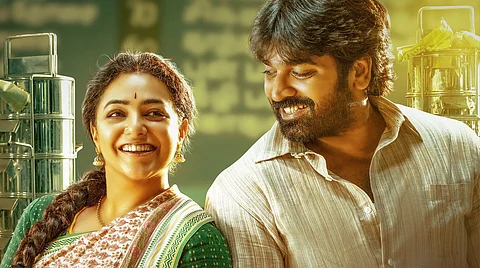

Follow TNM's WhatsApp channel for news updates and story links.
Thalaivan Thalaivii (Tamil)
There’s a version of Thalaivan Thalaivii that works — one where a porotta-making husband and a food-loving wife fall in love, clash, and figure each other out amid the chaos of overbearing families. That version shows up every now and then, in their shared love for food, in the charming glances they exchange, or in the earnestness with which they seem to reach out for each other. But for the most part, it’s buried under loud arguments, repetitive conflicts, and a script that stretches itself thin.
Directed by Pandiraj, the film is by turns funny, charming, frustrating, and exhausting. It wants to capture the messiness of marriage — and sometimes it does — but more often, it leans into noise over nuance. At the centre is a couple with genuine chemistry, played with feeling by Vijay Sethupathi and Nithya Menen. Around them is a chorus of family members who rarely help and often inflame. The love story, initially fresh and endearing, slowly fades into the background of a family drama that overstays its welcome.
Aagasaveeran (Vijay Sethupathi) falls for Perarasi (Nithya Menen) the first time he sees her, during a visit to her home with his family, seeking a marriage alliance. A skilled cook and the “porotta master” of his family-run Hotel Raghavarthini, he wins her over with soft paal porottas and a boyish sincerity. Their chemistry in these early scenes is effortless. The way they tease, flirt, and cook their way into each other’s lives gives the film some of its most watchable, charming moments.
Unfortunately, as the plot unfolds, that flavour starts to get lost. We keep circling the same domestic squabbles, just with more shouting or new side characters chiming in. The momentum sags, the noise level rises, and the plot goes nowhere. In a seeming attempt at novelty, the film follows a non-linear structure, but it only serves to drag the film on for longer than it should.
By the second half, the film begins to feel like a TV serial caught in a feedback loop. There is a scheming mother, mother-in-law, sister-in-law, a hot-headed brother, and a few poor hapless husbands caught in the crossfire.
The initial spark of conflict is almost absurd in its simplicity — Aagasaveeran’s father asks Perarasi to sit at the billing counter and praises her for helping the hotel earn a profit of Rs 5000 in a day. His mother, who has done the same work for years without recognition, feels slighted. His sister Raghavarthini, already resentful that the hotel and even the family autorickshaw have been renamed after Perarasi instead of her, grows jealous. As mother and daughter together start offloading more work onto Perarasi out of spite, Perarasi’s mother, on the other side, begins subtly poisoning her daughter’s mind against her in-laws.
At one point, the film even resorts to the age-old regressive trope of a tired husband literally ‘slapping some sense’ into his wife. Towards the end, after a tonsuring ceremony that stretches for far too long, one of the characters looks at the ongoing fight and asks, “Innum ithai mudikkalanga?” (They still haven’t finished this?), and you find yourself nodding in spiritual resonance.
Throughout the film, there are simply too many characters on screen, and only a few who actually matter. Yogi Babu shows up now and then with his trademark one-liners and hilarious delivery, and singlehandedly lands several good laughs. The rest of the ensemble, large as it is, mostly blends into the noise.
What’s most troubling, though, is the film’s regressive undercurrent. Divorce is mocked as a trivial decision, with a prominent character, in one scene, earnestly claiming that people seek divorce only to chase independence. In a country where the social stigma around divorce is still deeply entrenched, this kind of messaging feels careless, if not outright dangerous.
Technically, the film has a few things going for it. Santhosh Narayanan’s background score adds texture and emotional heft to several scenes, especially when the drama threatens to spin into chaos. M Sukumar’s cinematography is serviceable, capturing domestic spaces with simplicity. The editing, though, could’ve used a firmer hand — especially in the second half, where the pacing turns glacial.
In the end, Thalaivan Thalaivii is a rough-around-the-edges family drama that works in fits and starts, carried largely by its two leads, and weighed down by a confused, outdated script. If you’re a fan of Vijay Sethupathi or Nithya Menen, and especially of watching them bicker and brood in thick Madurai dialect, there’s something here for you. But keep your expectations tempered, your ears protected, and your patience close at hand.
Disclaimer: This review was not paid for or commissioned by anyone associated with the film. Neither TNM nor any of its reviewers have any sort of business relationship with the film’s producers or any other members of its cast and crew.